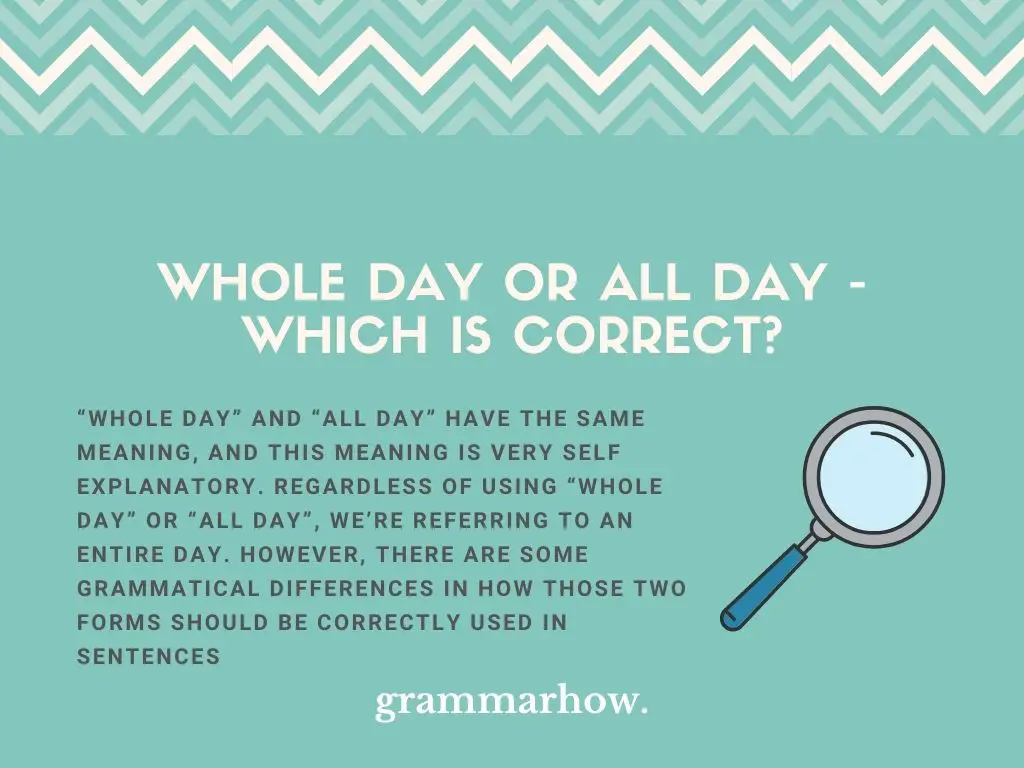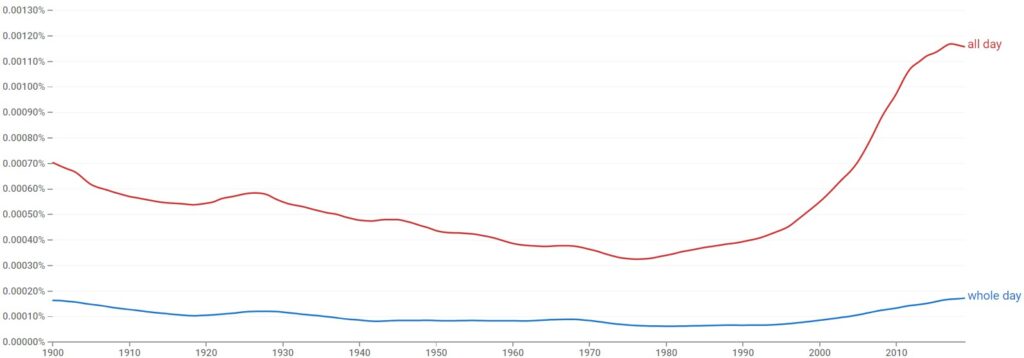Sometimes, there are multiple ways of saying the same thing. The better you know your options, when expressing your ideas, the better communicator you’ll be.
With that in mind, are “Whole Day” and “All Day” the same? And if so, what’s the best way to apply them?
Whole Day or All Day – Which Is Correct?
“Whole Day” and “All Day” have the same meaning, and this meaning is very self explanatory. Regardless of using “Whole Day” or “All Day”, we’re referring to an entire day. However, there are some grammatical differences in how those two forms should be correctly used in sentences.

“All Day” is used by itself, with no need for an article to accompany it. “Whole Day”, on the other hand, needs to be preceded by an article, or it’ll be grammatically wrong. Let’s get started with some examples:
- Ned will be at the hospital all day.
- Ned will be at the hospital whole day. (this is incorrect)
- Ned will be at the hospital the whole day.
By the examples, you see that to be able to correctly use “Whole Day”, you need to add an article to the sentence – in this case, “the” before “whole day”. That article isn’t needed when using “All Day”.
Even if you read the second sentence, that lacks the article, aloud, you’ll notice something is missing and it’d be an incorrect way to make that statement.
In other words, “All Day” and “Whole Day”, despite having the same meaning, can only be used interchangeably as long as the grammar is corrected to adjust to each form.
What Does “Whole Day” Mean?
“Whole Day” refers to an entire day. This expression is usually applied when we want to illustrate a long period of time. “Whole Day” can be used literally or figuratively, but it always must be preceded by an article that will define it, make it specific.
Take a look at some examples of “Whole Day” used in a sentence:
- I was at work the whole day.
- Yesterday, Sarah spent that whole day at her sister’s house.
- I’ve been worried about Ethan the whole day.
- Sophia played the whole day at summer camp.
- Manny needs to be gone a whole day next week.
In every sentence we clearly understand that a “Whole Day” was (or will be) needed for an activity to take place. However, in each case, there’s an article before “Whole Day”: “the” and “a”, for example. “That” sometimes works too, as seen in sentence 2.
What Does “All Day” Mean?
“All Day” means an entire day, just like “Whole Day”. However, it’s slightly easier to use in a sentence, because it doesn’t require an article to precede it. You can just add it to your statement, and it should work fine.
Let’s see some examples of “All Day” used in a sentence:
- I was at work all day.
- Claire will be gone all day.
- Emma has practice all day tomorrow.
- Roger had been at the station all day.
- The chef didn’t get a break all day.
Every sentence tells us that it took a full day (or it’ll take a full day) for an event to take place. But simply because we chose “All Day” instead of “Whole Day”, no article is needed and the grammar in the sentence turns out less complicated.
Which Is Used the Most?
“Whole Day” and “All Day” may have the same meaning, but is one form more used than the other? Take a look at the graph from Google Ngram Viewer below.

We can see by the graph that “All Day” is used way more frequently than “Whole Day”.
Our guess is that “All Day” is simpler and requires less grammar knowledge. Given that it’s very common that in daily conversations people would choose an easier way to convey a message, “All Day” is possibly the most common choice.
Final Thoughts
The good thing about having two expressions with similar meaning is to have options when speaking. “Whole Day” and “All Day” convey the same meaning, but are used differently. When choosing “Whole Day”, never forget it needs a preceding article. And chose “All Day” when looking for a simpler sentence.

Martin holds a Master’s degree in Finance and International Business. He has six years of experience in professional communication with clients, executives, and colleagues. Furthermore, he has teaching experience from Aarhus University. Martin has been featured as an expert in communication and teaching on Forbes and Shopify. Read more about Martin here.
